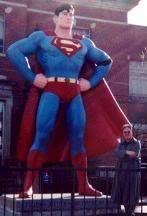| Pop Culture Gadabout | ||
|
Tuesday, March 26, 2013 ( 3/26/2013 06:27:00 AM ) Bill S.  For this reader, for instance, I couldn’t help noting the absence of the noir-y Truman Era “picture novel,” It Rhymes with Lust or the later publication of underground giant R. Crumb’s Yum Yum Book in 1975 (three years before Will Eisner’s A Contract with God, typically acknowledged to be the first modern graphic novel.) Too, while Weiner discusses the role of comic strip collections in leading the way in the sixties for later trade collections of comic book material, he fails to single out Walt Kelly’s “Pogo” paperbacks – which frequently featured extended storylines every bit as “novelistic” as later superhero collections (cf. Prehysterical Pogo (In Pandemonia), which took much of the strip’s cast to a dinosaur inhabited lost world in Australia) – a glaring omission to this fan’s eyes. Still, Faster than a Speeding Bullet does capture the recognized landmarks of the modern graphic novel: Contract (less a novel, as Weiner notes, than a thematically connected quartet of short stories a la Winesberg, Ohio), Frank Miller’s Dark Knight Returns, Art Spiegelman’s Maus: A Survivor’s Tale, Harvey Pekar’s American Splendor and much that followed. Though its title gives the impression that the book’s focus will be on superhero GN fare like Knight or Neil Gaiman’s Sandman, Weiner provides a broader view of comics’ maturation as a storytelling form. If at times he comes across a bit timorous when dealing with some of the more challenging sources of graphic novels (discussing Maus, for example, he bypasses the work’s nascent version in an underground comix book), he doesn’t downplay their significance. As with too many American comics fans, Weiner is overly brief in regards to European albums and manga (perhaps a better subtitle for this book would be “Rise of the North American Graphic Novel”), but considering the book’s length this isn’t surprising. He does manage to pull in some of the extraordinary recent GNs by women artists (Marjane Satrapi’s Persepolis and Alison Bechdel’s Fun Home) in this new edition. More than just speeding bullets, in other words.
(First published on Blogcritics.) Labels: comics history # | |
|
|

